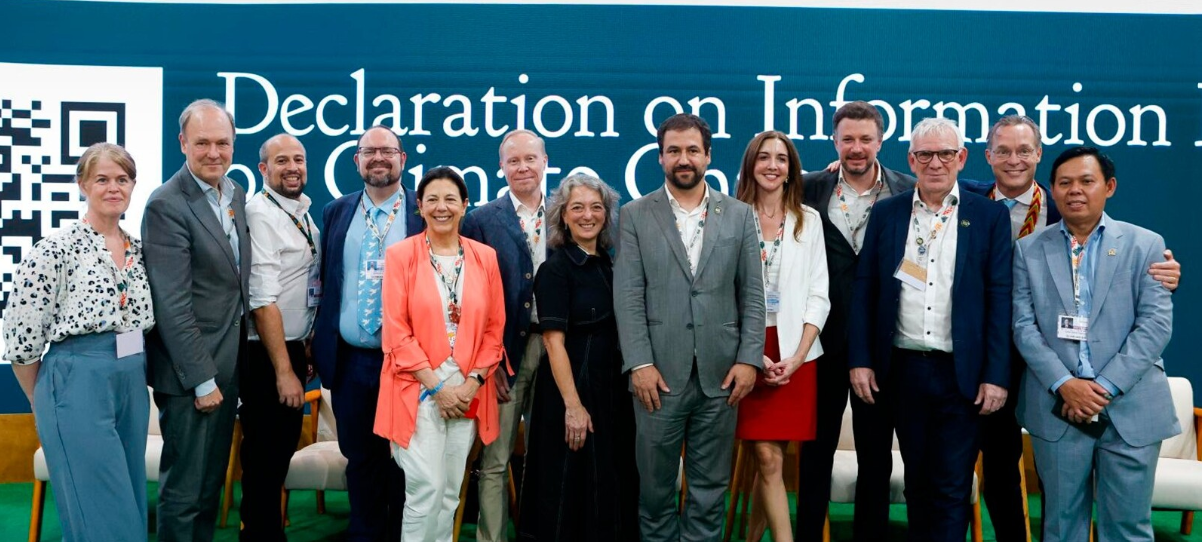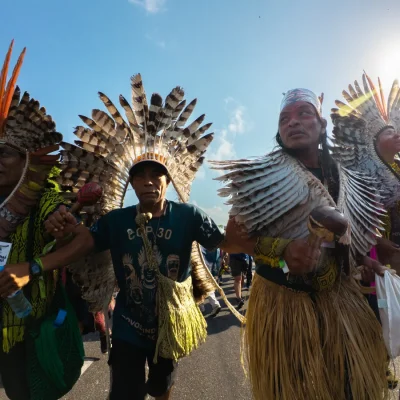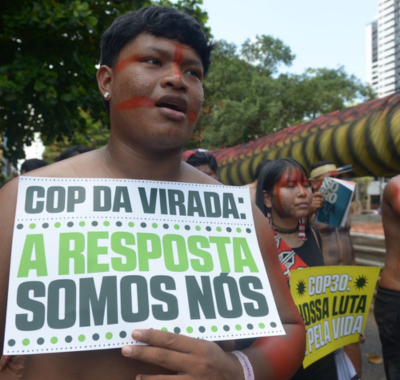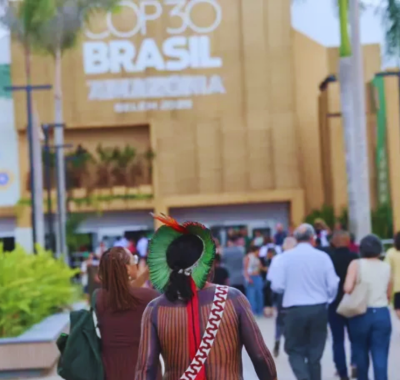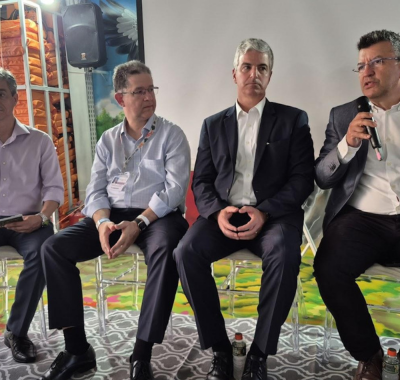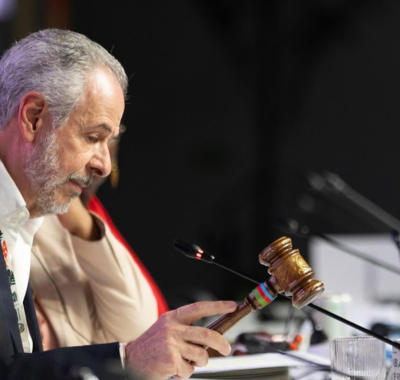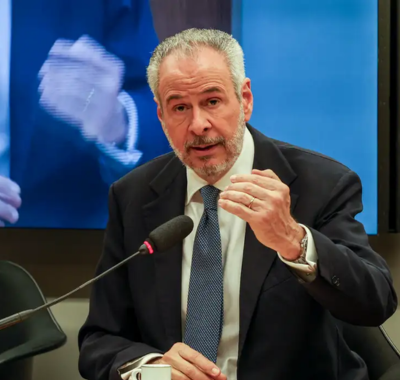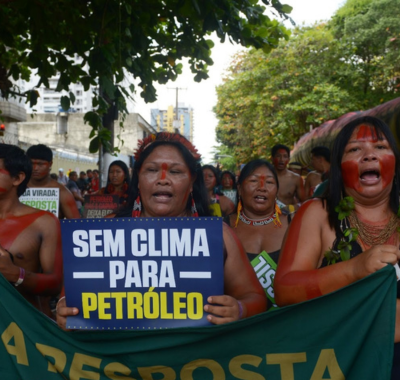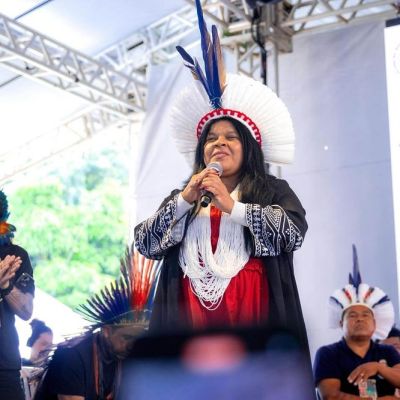Fred Santana – From Cenarium
Translated by Diego Lopes/Verso Tradutores
BELÉM (PA) – For the first time in the history of the Conferences of the Parties (COPs), the issue of the integrity of information on climate change has gained central prominence in international negotiations. The “Declaration on Information Integrity on Climate,” launched during COP30 in Belém this Wednesday (12), brings together countries, UN agencies, and civil organizations in a global commitment to combat misinformation that threatens the fight against the climate crisis.
The document was prepared by the Steering Committee of the Global Initiative for Information Integrity on Climate Change, co-chaired by UNESCO, Brazil, and the United Nations. It calls on governments, businesses, universities, and civil society to promote healthy, transparent, and evidence-based information environments as a foundation for effective climate action.
In an exclusive interview with CENARIUM, Guilherme Canela, director of the Division of Digital Inclusion, Policies and Digital Transformation at UNESCO, explained that the initiative seeks to strengthen technical and regulatory capacities in developing countries, without abandoning fundamental principles.
The director of UNESCO’s Division of Digital Inclusion, Policies and Digital Transformation, Guilherme Canela (Reproduction/UN News)
“UNESCO is the United Nations agency for issues of access to public information, freedom of expression, safety of journalists, etc. We have told our 194 member states that we are open to technical cooperation, training of personnel and regulators, and discussion of governance of the digital ecosystem, always with one non-negotiable principle: the protection of freedom of expression and access to public information cannot be compromised,” Canela stated.
According to him, the fund created by the Global Initiative prioritizes actors from the Global South, due to the lack of funding for research and investigative journalism on the subject. “We have already announced the first ten beneficiaries, all from the Global South, developing projects in the region. This is one of the fund’s priorities,” he added.
The Belém Declaration highlights that the climate crisis demands not only political action, but also the mobilization of the entire society, based on consistent, reliable information grounded in scientific evidence. It also acknowledges the risks that misinformation, denialism, and attacks on journalists and scientists pose to the advancement of environmental policies.
Canela emphasized the importance of the topic being elevated to one of the central pillars of COP 30. “This is the first COP in history where information integrity is one of the guiding principles of the negotiations. This issue will not disappear with this COP. It is important that this is not the first and the last in which this topic has been placed as an important pillar,” he highlighted.
The director emphasized that strategic communication is essential to bridge the gap between knowledge about the crisis and effective action. “Research shows that 89% of people believe we have a climate change problem, but that number doesn’t translate into effective action. We need to improve the conversation about it. The volume of misinformation is likely influencing this inaction, despite the understanding that there is a problem,” he assessed.
The Declaration calls on governments to create policies of transparency and safety for journalists, scientists, and environmental advocates, and to ensure public access to climate data. It also encourages the private sector to adopt responsible and transparent advertising practices and invites funders and universities to support information integrity projects, especially in developing countries.
Declaration calls on governments to create transparency and safety policies for journalists (Reproduction/ Pixabay )
“The priority of the fund and the Initiative’s actions is to ensure that countries in the Global South have the conditions to lead the construction of democratic and resilient digital ecosystems. This is essential to confront both disinformation and the climate crisis,” Canela concluded.
The urgency expressed in the Declaration on Information Integrity on Climate, launched at COP30, is backed up by science. Recent studies show that combating misinformation is as essential as cutting emissions to tackle the climate crisis.
One of them, published in 2024 on PubMed, titled “Disinformation as an obstructionist strategy in climate change mitigation: a review of the scientific literature for a systemic understanding of the phenomenon,” reveals that climate misinformation operates as an organized strategy to obstruct environmental policies.
The research reviews 75 articles published between 2019 and 2023 and shows that coordinated campaigns, often funded by economic interests linked to fossil fuels, manipulate public debate and weaken support for urgent climate action.
This reality is even more critical in the Global South, where there is a lack of resources to monitor and respond to disinformation campaigns. The study “Dynamics of Climate Disinformation in Facebook and Instagram Posts in Brazil,” published in 2025 in the journal Comunicação e Sociedade, shows how, in the Brazilian context, disinformation narratives do not directly deny the climate crisis, but rather dilute it.
According to the authors, the discourse shifts from denial to discrediting solutions, questioning energy transition policies, or minimizing environmental impacts. This more subtle form of digital manipulation reinforces what the new COP 30 Declaration seeks to address: a fragile informational ecosystem, where doubt becomes a political instrument and threatens the global capacity to act in the face of the climate emergency.
—
This report was produced by Revista Cenarium, through the Collaborative Socio-environmental Coverage of COP 30. Read the original report at: https://revistacenarium.com.br/cop30-lanca-declaracao-global-para-combater-fake-news-sobre-clima/

